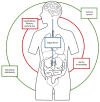The Microbiota-Gut-Brain Axis: Psychoneuroimmunological Insights
- PMID: 36986226
- PMCID: PMC10059722
- DOI: 10.3390/nu15061496
The Microbiota-Gut-Brain Axis: Psychoneuroimmunological Insights
Abstract
There is growing interest in the role that the intestinal microbiota and the related autoimmune processes may have in the genesis and presentation of some psychiatric diseases. An alteration in the communication of the microbiota-gut-brain axis, which constitutes a communicative model between the central nervous system (CNS) and the gastro-enteric tract, has been identified as one of the possible causes of some psychiatric diseases. The purpose of this narrative review is to describe evidence supporting a role of the gut microbiota in psychiatric diseases and the impact of diet on microbiota and mental health. Change in the composition of the gut microbiota could determine an increase in the permeability of the intestinal barrier, leading to a cytokine storm. This could trigger a systemic inflammatory activation and immune response: this series of events could have repercussions on the release of some neurotransmitters, altering the activity of the hypothalamic-pituitary-adrenal axis, and reducing the presence of trophic brain factors. Although gut microbiota and psychiatric disorders seem to be connected, more effort is needed to understand the potential causative mechanisms underlying the interactions between these systems.
Keywords: autoimmunity; brain; gut microbiota; mood; nutrients.
Conflict of interest statement
The authors declare no conflict of interest.
Figures
References
Publication types
MeSH terms
LinkOut - more resources
Full Text Sources



